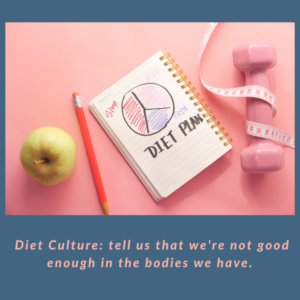Here is my story about diet culture and the effects of fad dieting. I remember moving away from home to attend college in Long Beach, California. I was young and so excited to be in close distance to some of southern California’s most famous beaches and party life.
But navigating new experiences and adjusting to more independence can be pretty stressful.

Did you know that one of the top 10 stressful events for young women is going to college? These transitions can be potential factors to developing disordered eating characteristics. Not only were there pressures of working part-time and going to school full time, my health and self-care routine got put on the back burner. To help alleviate this, I even added ‘gym time’ as an elective to force myself to get some exercise time in.
My weight was increasing, and I felt inadequate to keep up with the demands of the ‘ideal’ image of what a Southern California female in her 20’s should look like. So, I bought the diet books and the diet pills because I didn’t have time to put more thought into my food intake.
I just wanted a list of instructions on what to eat.
However, I logically knew that this was not a healthy approach. My body fluctuated in weight, causing my brain to go haywire, primarily because the diet pills were so high on caffeine, I was not getting much sleep, let alone not getting enough nutrients.
Research recommends that fad diets and supplements should have the same regulatory guidelines as prescription or over-the-counter drugs. The Dietary Supplement Health and Education Act (DSHEA) classified dietary supplements as food. So, the FDA cannot regulate as strictly as drugs.
Crazy right?!?
Fad diets are generally written with good intentions, but many fad diets are not backed by research stating the long-term impacts, and/or the writers do not have valid nutrition-related credentials.
Here is some research highlighting the health effects of fad dieting in a diet culture:
- Many people feel that fad diets work because they may lose much water and muscle due to eating fewer calories. Rapid weight loss can contribute to constipation, low energy, and increased tiredness.
- Chronic dieting can lead to psychological implications such as food obsession, calorie counting, and fatigue. This can trigger the over-eat and under-eat cycles contributing to disordered eating and depression.
- Many of the fad diets focus on one food type or a specific food group. This increases the chances of being nutritionally unbalanced, and it does not help that many of these diets are not backed by long-term research.
- Lastly, many of these diets may require food preparation and lifestyle changes that may not be realistic. The foods may also not be accessible or pocket-friendly to everyone.
Fast forward many years, I am happy to be in this part of my nutrition journey in where I know there is no such thing as an ‘ideal’ body image and getting back to the basics on intuitively listening to my body cues. It is rewarding to see the self-body shaming talk decreasing and increasing pleasure in all foods.
And quite honestly, what a relief!
Although it is a work in progress to break the old paradigm thinking, it is more enjoyable than adhering to unrealistic diet culture rules, such as fad diets.
Check out the Nutrition and Mental Health post to learn more about the food-mood connection.
With gratitude,
Tara
References:
Murphy, J., Geary, H., Millgate, E., Catmur, C., & Bird, G. (2018). Direct and indirect effects of age on interoceptive accuracy and awareness across the adult lifespan. Psychonomic Bulletin & Review, 25(3), 1193-1202.
Tribole, E., & Resch, E. (2012). Intuitive Eating. New York, NY: St. Martin’s Griffin. ISBN-10: 1250004047